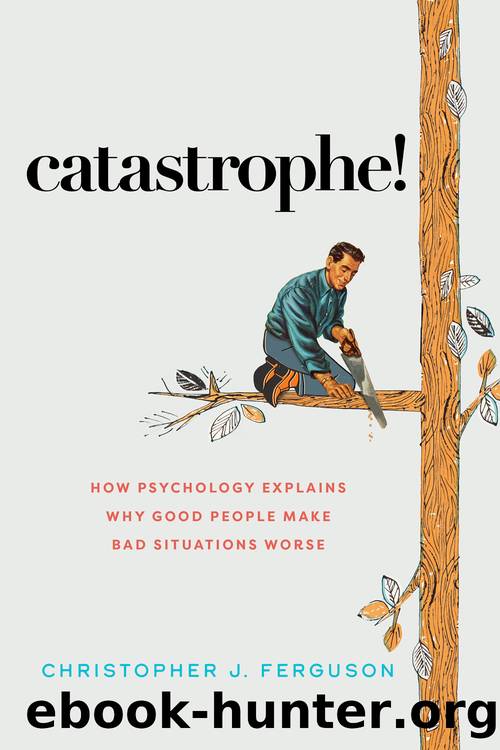Catastrophe! by Christopher J. Ferguson

Author:Christopher J. Ferguson
Language: eng
Format: epub
Publisher: Prometheus
Published: 2022-07-23T00:00:00+00:00
SYSTEMIC RACISM IN ECONOMICS
There are basically two ways to look at how racism influenced economics in the United States. The first is that, due to a history of slavery and Jim Crow in the United States, even if racism was vastly reduced since the 1960s, the legal playing field largely made equal, and some programs such as affirmative action specifically target minority advancement, it can simply take generations for wealth gaps to disappear and thereâs no âmagic bulletâ to change that. The second is the argument of âsystemic racism,â namely that whether intentional or not, there are still thumbs on the scales in favor of white Americans as compared to nonwhites and, as such, the United States remains a white supremacist state. Overall, the evidence supports the first view and falsifies the second. Once again, this is important to understand if we are not to enact policies that are harmful.
Ethnic disparities in wealth and income definitely exist in the United States, and thereâs little question that a history of slavery, Jim Crow, and past racist policies such as redlining (effectively segregating housing by race) contributed to disparities that continue to exist today. But thereâs an important distinction to be made: Are we still experiencing the sequelae of past racism, even if anti-black racism today is but a shadow of what it once was? Or are we today still in an effectively anti-black apartheid regime, where spoken or unspoken rules continue to put the thumb on the scale against black people? Knowing the difference helps us know what policies may helpâor for that matter, actually hurt. In other words, we need to be sure, otherwise any decision we make may worsen rather than improve issues.
Itâs important to point out that not all disparities are due to racism or sexism. Otherwise, the criminal justice system is sexist against men (men are vastly overrepresented in prison), as is academia (men are generally falling behind women in educational success). The mental health system would be prejudiced against whites (whites are overrepresented both as victims of suicide and opioid overdoses). Some disparities are due to systemic injustices, some simply are not; even reflecting real differences among groups (for instance, although there are fewer women in STEM careers or among Fortune 500 CEOs, part of the issue may simply be that women are less interested in these careers than men). Of course, things can be complicated. For instance, I suspect few people would agree that centuries of explicit racism in the United States have no impact on todayâs disparities particularly influencing African Americans (I use this term deliberately here as weâll see in a bit). But as Wilfred Reilly has noted in his book Taboo, itâs also important to recognize the impact of things such as fatherlessness, poorer academic outcomes, and even the comparative younger age of black versus white Americans.23 Economist Glenn Lowry (a black man) makes much the same pointâit is important to acknowledge historical impacts such as racism in the United States, but
Download
This site does not store any files on its server. We only index and link to content provided by other sites. Please contact the content providers to delete copyright contents if any and email us, we'll remove relevant links or contents immediately.
Spare by Prince Harry The Duke of Sussex(5181)
Machine Learning at Scale with H2O by Gregory Keys | David Whiting(4296)
Fairy Tale by Stephen King(3370)
Will by Will Smith(2911)
The Bullet Journal Method by Ryder Carroll(2561)
Hooked: A Dark, Contemporary Romance (Never After Series) by Emily McIntire(2551)
Rationality by Steven Pinker(2352)
It Starts With Us (It Ends with Us #2) by Colleen Hoover(2345)
Can't Hurt Me: Master Your Mind and Defy the Odds - Clean Edition by David Goggins(2324)
Friends, Lovers, and the Big Terrible Thing by Matthew Perry(2219)
The Becoming by Nora Roberts(2189)
Love on the Brain by Ali Hazelwood(2062)
A Short History of War by Jeremy Black(1843)
The Strength In Our Scars by Bianca Sparacino(1841)
HBR's 10 Must Reads 2022 by Harvard Business Review(1840)
Leviathan Falls (The Expanse Book 9) by James S. A. Corey(1729)
A Game of Thrones (The Illustrated Edition) by George R. R. Martin(1726)
515945210 by Unknown(1662)
Bewilderment by Richard Powers(1609)
